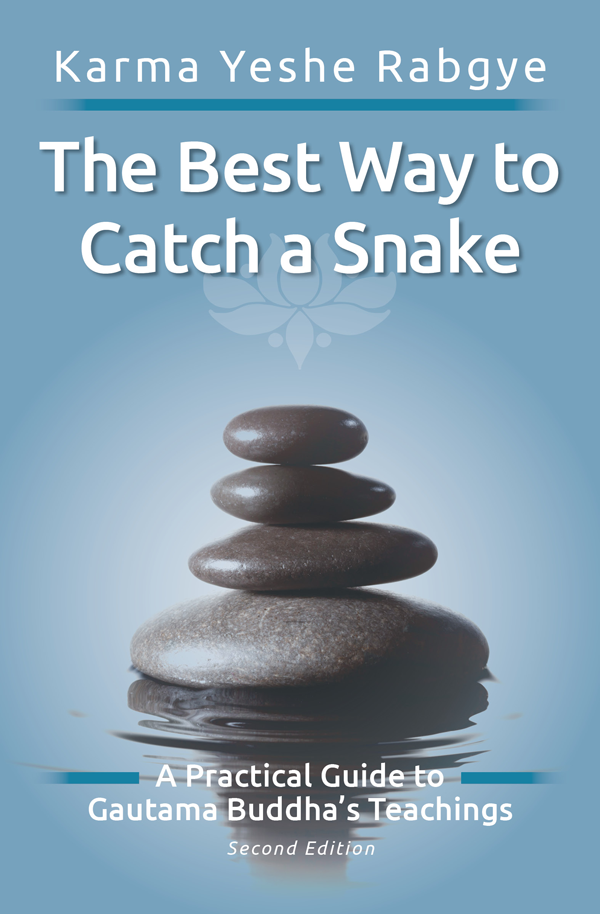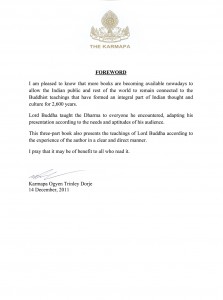Buddhist Book Reviews
The Best Way to Catch a Snake by Karma Yeshe Rabgye is subtitled A Practical Guide to the Buddha’s Teachings, and its aim is to help the reader understand the true essentials of Buddhism. As a guide to the fundamentals, this book will be very useful to those who are just starting to explore Buddhism, but it isn’t written exclusively for beginners by any means. As the author states in his Introduction, many people tend to jump into things without much research, but taking that approach with Buddhism leads to confusion, so this book is also for those who have already ‘jumped into Buddhism’ and would now like to get to grips with its core teachings.The title of this book is inspired by the Buddha’s observation that the best way to catch a wild snake it to use a forked stick to pin its head down so that it won’t bite the handler.
Similarly, this volume helps you to pin down the basics of Buddhism so that you don’t simply get caught up in ‘religious trappings’ and fail to acquaint yourself with the really important concepts and ideas that the Buddha taught. It is divided into three main sections, and these focus on The Four Seals, The Four Noble Truths and The Four Preliminary Thoughts.
In the first section, the author discusses The Four Seals that form the bedrock of Buddhism: 1) All compounded things are impermanent, 2) The consequences of emotions are suffering, 3) All things have no inherent existence, and, 4) The final goal is beyond our understanding. These concepts are ones that many people find quite difficult to understand, but Karma Yeshe Rabgye explains them in such a way that they almost seem obvious. That ability to communicate complex ideas in a simple, straightforward and jargon-free manner is the sign of a great teacher, and when you have reached the end of this section you will realise that Karma Yeshe Rabgye has it in spades.
The next section focuses on The Four Noble Truths, which are the truth of dukkha (most often translated as suffering), the truth of the origin of dukkha, the truth of the cessation of dukkha and the truth of the path leading to the cessation of dukkha. Although these Four Noble Truths are perhaps the most well-known of the Buddha’s teachings, the author presents them here not simply as a theoretical framework but in a way that is directly and practically relevant to daily life. This was, of course, the Buddha’s original intention, so it is refreshing to see it carried through so well here.
The third and final section of the book discusses The Four Preliminary Thoughts – precious human life, impermanence, karma and the defects of the world – and explains how we can meditate on them to train the mind and make our lives more meaningful.
In summary, The Best Way to Catch a Snake is easy to read, hugely relevant to daily living and a title that you will want to refer back to again and again. Whether you are completely new to Buddhism or simply want to make sure that you have a thorough and practical grasp of the core fundamentals, we would highly recommend this book as essential reading.
http://www.buddhist-book-reviews.com
Dharma for All
It takes less than a page of reading this gem of a book to understand why it has been endorsed by His Holiness 17th Karmapa. The Best Way to Catch a Snake is more than another entry-level book to Buddhism; it is a must for all practitioners! Even seasoned meditators and experienced students will benefit from revisiting the essential foundations taught by the Buddha. Using clear language and helpful guidance, the author coaxes the reader to reflect on the subject matter, interspersing the text with questions for contemplation. Whilst easy to read, definitely not to be skimmed!
Bob Pollak, Northants Buddhist Meditation Centre, UK
Clear and concise - a contemporary introduction to the Buddha’s teachings
As a student and practitioner of Buddhism, I welcome Venerable Karma Yeshe Rabgye’s clear and concise introduction to the central teachings of the Buddha.His text covers the Four Seals, the Four Noble Truths, and the Four Preliminary Thoughts and includes appendices on the various schools of Buddhism and a short biography of the life of the Buddha.
Overall, Ven. Karma Yeshe Rabgye presents the subject matter in a way that allows a contemporary reader to relate the teachings to his/her life. At various points, the text invites the reader to think about different aspects of the material by posing questions that are intended for further reflection. Furthermore, Ven. Karma Yeshe Rabgye draws on a broad variety of scriptures that belong to various traditions of Buddhism to illustrate and support the claims he makes. Though he clearly identifies his own perspective (the Karma Kagyu tradition), he embraces the wisdom that is found in the writings of other schools of Buddhism as well. Contemporary references and a sense of humor make “The Best Way to Catch a Snake” pleasant to read and easy to follow.
The only suggestion I have is that, in the next edition, the list of sources that appear in the bibliography section be expanded to include all of the texts that are mentioned in the book. Doing so will allow the reader to follow up on the various canonical writings much more easily.
In summary, “The Best Way to Catch a Snake” is a clear and concise introduction to the principles of Buddhism that is intended for a general reader. I would certainly consider including it in an introductory course on Buddhism that is taught at the college or university level.
By Christian M. Mahoney, M.A., Ph.D. (Amazon.com)
Back to Buddhist basics
Karma Yeshe Rabgye was born in UK, and is now living in India as a monk in the Kagyu tradition of Tibetan Buddhism. In this book he describes the fundamentals of Buddhism - which all Buddhist schools agree on.The teachings of the Buddha are universal, and valid for any culture. They are expressed in different ways, according to different cultures; and they can - and do - become overlaid with cultural traditions. Westerners often are either discouraged by these traditions, or embrace them fully, disregarding their own culture.
One of the great advantages of this book is exactly its focus on the basics of Buddhism, which go beyond cultural trappings, and of explaining them in language easily understandable for westerners. If you want information about what is the basic teaching of Buddhism, I recommend this book wholeheartedly.
By karl (Amazon.com)
Helpful
This book was a wonderful gift from my Spiritual teacher and friend. I am just starting out on my path and it has been a great guide to help me better understand Buddhist Philosophy. It’s practical and easy to understand. I would highly recommend this book to anyone who may be drawn to Buddhism.
By jweb (Amazon.com)
A refreshing read, beautifully written
The Best Way to Catch a Snake provides a beautiful introduction of Buddhist philosophy and practice, with contemporarily relevant insights and well-researched ancient texts. A refreshing read, one that I’m certainty going to share- it will be one of the top gifts to my Buddhist friends and family.
Help other customers find the most helpful reviews
By Mel (Amazon.com)
Crystal Clear!
What I loved about The Best Way To Catch A Snake is that it stripped back the ritualistic layers of Buddhism and presented its essential insights, of which almost anybody can see the obvious merit. This is not just for the sake of clarity; it is also in response to the lama’s accurate observation that many Westerners are confused about what it really means to be a Buddhist. This is something Karma Yeshe Rabgye has special insight into since he was originally from the U.K. before studying in Tibet and India, where he now practices.
By Ben Miller (Amazon.com)
The Best Way To Catch A Snake
Lama Karma Yeshe Rabgye presents the ancient teachings of Buddhist traditions and wisdom in a simple and straight forward way. He manages to convey to the reader the most fundamental teachings of Buddhism throughout the book and he shares very easy methods to help the reader learn the importance of being responsible for his/her own thoughts and actions and through such mindfulness training, the reader comes to discover the kindness, compassion and peace that is inherent in all of us.One does not need to be a Buddhist to benefit from reading this book. It is a source of inspiration and is truly a handbook for living consciously in our modern world.
By CMG (Amazon.com)
It’s the clearest and most accessible book on Buddhism that I have read. Really like the questions and calls to reflect on what has been written. You have a nice conversational way of writing, which is contrary to many Buddhist books which seem to strive to be obtuse. I think truly understanding realities like impermanence, interdependence and the Noble Truths can have a profound impact on the way we live our lives. Knowing something will pass is actually pretty awesome, as is knowing that there is a path to end suffering (as hard as it can be to stay on it).
By Darlene Taylor (USA)
A clear and concise introduction to the subject of Buddha’s teachings, 29 Sep 2012
Yeshe Rabgye’s common sense and straight forward approach make The Best Way to Catch a Snake a pleasure to read. I found this book to be clearly written and easy to understand, as well being very informative. A clear and concise introduction to the subject of Buddha’s teachings with some excellent advice thrown in from the author. It’s an excellent place to start if you’re new to Buddism. Highly recommended.
By R. D. Ravelin (Hastings, UK)
An excellent practical guide for beginners
I am not a Buddhist but I found this book an excellent guide to Buddha’s teachings. I enjoyed the read and found its simplicity helped me to understand Buddhist beliefs. I would encourage anyone who is interested in Buddhism, especially Buddha’s foundation teachings, to read this book and follow its practical contemplation’s.
By C. L. Zoumides (London, UK)











